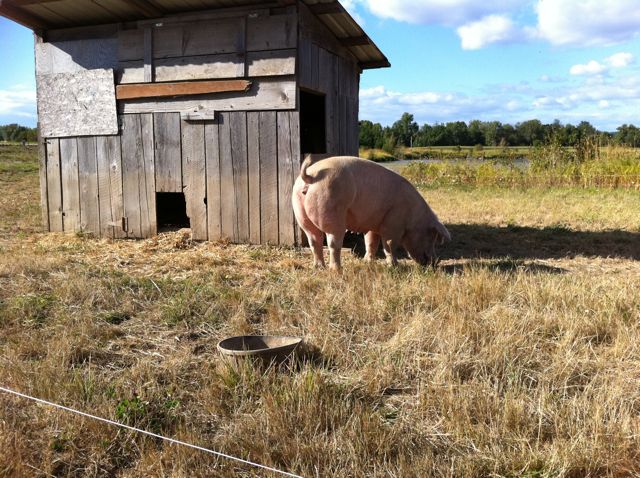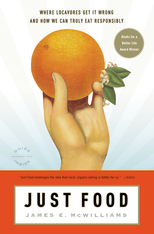
promo-image, l
(article, Emily Stone)
[%pageBreakSettings nobreak=true] I subscribe to the Association for the Study of Food and Society’s listserv, an email forum of sociologists, anthropologists, political theorists, philosophers, and academics of all kinds who conduct research into the way we eat. Amid announcements for various conferences, suggestions about course materials, and policy discussions, messages often come through expressing a very specific set of preoccupations and concerns: “Does anyone know of any scholarly work that critiques Jamie Oliver, Michael Pollan, Alice Waters, or any other contemporary diet reformers?” “Pollan's use of historical ‘facts’ is fast and loose on occasion . . . We can't expect better from him, I fear.” “The thing for me is, for whom is Pollan writing? Is it for us on this list? I think not.” Wait, Michael Pollan? The champion of sustainable eating and agriculture who’s publicized the mounting threats to our foodsheds and foodways? Well, yes. For one, Michael Pollan does what academics generally can’t or won’t do: appeal to the masses. (Given that Pollan has made the political history of corn seem sexy, that’s quite a feat.) For another, despite all of his muckraking reporting deep in the putrid bowels of commercial feedlots, the crowded aisles of Whole Foods, and the gamey wilds of California’s forests, Pollan rarely reveals anything that hasn’t already been documented by the data or analysis of a painstakingly conducted academic study. In other words, he’s piggybacking on the hard work of professors. As another respondent on the ASFS list put it, “Pollan has played a crucial role in popularizing concepts and issues, but he is a journalist and not a scholar.” [%image feature-image float=right width=400 caption="A local pig."]How would a scholar have written The Omnivore's Dilemma or In Defense of Food? Presumably, with an academic notion of what it means to research the ominous story of the American diet. “I did not circumnavigate the globe to investigate the topics that I’m writing about directly,” writes environmental historian James E. McWilliams in his introduction to Just Food: Where Locavores Get It Wrong and How We Can Truly Eat Responsibly. “Instead, I settled in behind my desk in Austin, Texas, made the requisite phone calls, sent the critical emails, read the relevant reports, learned the scientific lexicons, did the hard research, and threw down my cards when I thought my hand was good.” McWilliams declares himself “a pragmatist and a skeptic” before outlining his concern that catchy campaigns about eating local ignore some of the most important demographic and environmental elements of the global food system. His most compelling and consistent criticism of today’s food-reform evangelism is that food miles are an inaccurate measure of sustainability. He points out, for example, that it’s more energy-efficient for Britons to eat New Zealand lamb than to raise sheep locally and for Europeans to eat African produce than to grow their own veg. As McWilliams considers the environmental and emotional appeals of the eat-local movement, his recommendations for a fundamental change in this First World philosophy are among the most measured and gracious comments he makes. This balanced tone, however, fades in subsequent chapters. McWilliams favors GMO agriculture, arguing that the potential benefits of genetically modified food for ending hunger and feeding our expanding global population far outweigh the risks. He’s against meat consumption, declaring that the earth, the air, and the water simply cannot bear the weight of the waste produced by our current system of producing meat. He’s a fan of aquaculture, stating that fish farms can be a low-impact, high-yield nutrition system. These chapters are for the most part soundly argued, but increasingly polemical. In particular, the chapter on land animals covers ethical terrain covered much better by Peter Singer (The Way We Eat), whom McWilliams quotes, and Jonathan Safran Foer (Eating Animals). “As conscientious consumers, we might have to forgo the trendy green slogans, and take on a more challenging task,” writes McWilliams. “One that asks us to think more critically, creatively, and comprehensively about how food is produced and consumed.” But McWilliams himself doesn’t meet this goal, shrinking his intellectual ambitions down into an enumerated list of reductive talking points: “Stop fetishizing food miles,” “Dissolve the dichotomy that now exists between organic and conventional products,” and so on. After a few hundred pages in vehement support of scholarly rigor, McWilliams seems uncharacteristically content to conclude with Pollan-esque mottos, such as “Fish without ponds + vegetables without soil = the future.” In some ways, McWilliams and Pollan have a lot in common. (In fact, McWilliams seems to warm to Pollan as the book goes on, quoting him more and more frequently.) After all, they each set out to document a problem in the way food politics was being reported to the public. They each became increasingly more radical in their own food politics as they worked on these projects. And in the process, they each made important information available to the public, while inevitably stripping away some of its subtlety. Though the author of Just Food has attracted less attention from the press and from the academy than his omnivorous rival (or his colleague, depending on how you look at it), I could imagine someone on the ASFS listserv asking the very same question about McWilliams as about Pollan: For whom is he writing? Of course, if you follow McWilliams's instructions to ask your own questions and think meaningfully about our larger food systems, you don’t need his book anymore. You can go out into the sea of global food debates and come to your own conclusions. p(bio). Currently based in China, Emily Stone is a freelance writer and the blogger behind Chocolate in Context.

promo-image, l

feature-image, l

reference-image, l

featurette-image, l